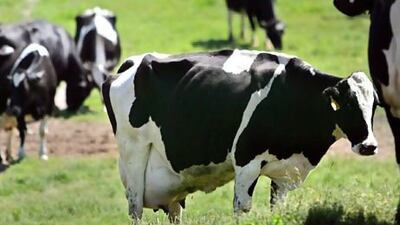Farmers across the world have long been soured by the margins they make on dairy products, as big-name retailers milk them hard to keep in-store prices down - and profits up.
Now, though, genetic research by Illumina and Life Technologies may help dairymen to reduce the cost of producing milk.
Procedures from the companies are allowing farmers such as Jonathan Lamb, with 4,000 milking cows at his family farm near Buffalo, New York, to find out in weeks, instead of years, which bulls will sire the best milking cows.
"I liken it to a scratch-off lotto ticket when I get the results every month," Mr Lamb said.
"Bull prices are minimum two times what they used to be."
Breeders market bulls based on the animal's ability to produce proficient milkers. In the past, a bull's performance could not be assessed until it was raised, mated and its offspring were old enough to gauge their milking ability.
Now, farmers are increasingly using DNA screens to find gene markers in young bulls that predict top production, said Tom Lawlor, a geneticist with the Holstein Association USA.
Mr Lamb said genetically superior milking cows now sell for US$40,000 (Dh146,931), with the best getting as much as $125,000. Prior to the genetic tests, a good animal might fetch $15,000, he said. On the downside, livestock without great genetics are selling for far less than before.
The genetic tests debuted about four years ago and are being quickly adopted in the industry, Mr Lamb said. Executives from Illumina, based in San Diego, and Life Technologies, of Carlsbad, California, say they are benefiting from the increased interest.
"We've now developed a high-growth, recurring-revenue business in both the livestock and agricultural segments," said Jay Flatley, Illumina's chief executive. Illumina has estimated testing generates more than $100 million, said Tristan Orpin, the company's chief commercial officer.
Illumina's bovine test is the result of a six-year effort by more than 300 researchers who sequenced and analysed the 22,000 genes of the animals' genetic code, which includes cell instructions for making milk and muscles. The genetic data also revealed how the cow's four-chambered stomach digests, changing grass forage into body tissues that make high-quality beef.
The test, called BovineSNP50, searches cattle DNA for 50,000 markers that indicate attributes such as good milk production, according to the company.
"We're seeing uptake of this at the level of hundreds of thousands of samples per year," said Christian Henry, Illumina's general manager of life sciences, said. "It's also going not only from high-value crops like cattle, but also sheep [and other animals] and then all of the fruits and vegetables."
American cows produced an average of 21,345 kilograms of milk last year, the US department of agriculture said. New Illumina tests may double that figure in a few years, Mr Lawlor said.
"We're looking at a pretty staggering impact on the industry," said Curtis Van Tassell, a geneticist at the agriculture department.
"We have not come near to exhausting the improvement we can make in the dairy cow."
* with Bloomberg News

